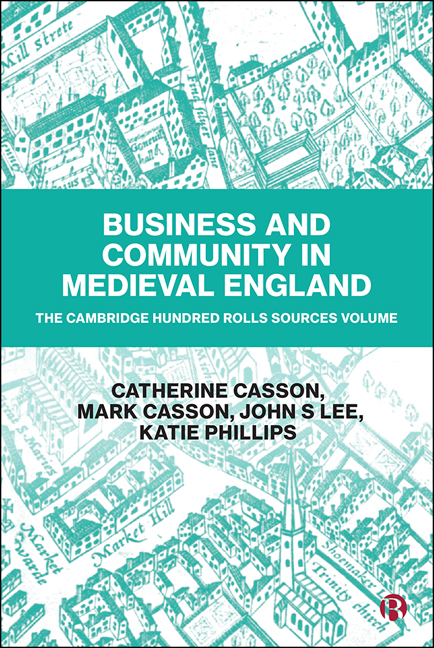Book contents
- Frontmatter
- Contents
- Abbreviations
- Notes on the Authors
- Introduction
- The Cambridge Hundred Rolls
- Appendix 1 Amercements in Cambridge 1176–7: List of People, Many From Cambridge, Who Were Amerced For Carrying Corn by Water Without a Licence
- Appendix 2 Cambridge Tallage of 1211: Analysis of Payments 1211–25
- Appendix 3 Amercements of the Abbot of Ramsey and William De Kantilup and Their Associates in Cambridge in 1219
- Appendix 4 Gifts (Oblata), Representing Fines For Offences Made By Cambridge People in 1221
- Appendix 5 Summary of Information in Published Editions of the Pipe Rolls Relating to People and Places in Cambridge, 1130, 1158–1224, 1230 and 1242
- Appendix 6 Selected Excerpts From Rotuli Curiae Regis I–XX, Relating to People and Places in Cambridge
- Appendix 7 Selected Excerpts From Calendar of Fine Rolls I–III, Relating to People and Places in Cambridge
- Appendix 8 Cambridge Debts: Selected Cases From the Exchequer of the Jews, 1219–81
- Appendix 9 Cambridge: Jewish Records of Debts by People Resident in Or Closely Connected to Cambridge
- Appendix 10 Feet of Fines: Selected Cases Relevant to the Town of Cambridge
- Appendix 11 Cambridgeshire Subsidy Rolls and Eyres
- Appendix 12 Mayors and Bailiffs of Cambridge, 1263–1300, as Listed by the Antiquary William Cole
- Appendix 13 Ancient Places in Cambridge
- Appendix 14 Family Dynasties of Property Owners
- References
- Index
Introduction
Published online by Cambridge University Press: 18 March 2021
- Frontmatter
- Contents
- Abbreviations
- Notes on the Authors
- Introduction
- The Cambridge Hundred Rolls
- Appendix 1 Amercements in Cambridge 1176–7: List of People, Many From Cambridge, Who Were Amerced For Carrying Corn by Water Without a Licence
- Appendix 2 Cambridge Tallage of 1211: Analysis of Payments 1211–25
- Appendix 3 Amercements of the Abbot of Ramsey and William De Kantilup and Their Associates in Cambridge in 1219
- Appendix 4 Gifts (Oblata), Representing Fines For Offences Made By Cambridge People in 1221
- Appendix 5 Summary of Information in Published Editions of the Pipe Rolls Relating to People and Places in Cambridge, 1130, 1158–1224, 1230 and 1242
- Appendix 6 Selected Excerpts From Rotuli Curiae Regis I–XX, Relating to People and Places in Cambridge
- Appendix 7 Selected Excerpts From Calendar of Fine Rolls I–III, Relating to People and Places in Cambridge
- Appendix 8 Cambridge Debts: Selected Cases From the Exchequer of the Jews, 1219–81
- Appendix 9 Cambridge: Jewish Records of Debts by People Resident in Or Closely Connected to Cambridge
- Appendix 10 Feet of Fines: Selected Cases Relevant to the Town of Cambridge
- Appendix 11 Cambridgeshire Subsidy Rolls and Eyres
- Appendix 12 Mayors and Bailiffs of Cambridge, 1263–1300, as Listed by the Antiquary William Cole
- Appendix 13 Ancient Places in Cambridge
- Appendix 14 Family Dynasties of Property Owners
- References
- Index
Summary
The Rotuli Hundredorum, better known as the Hundred Rolls, contain 1,800 pages of statistical information relating to property rents in c.1279 for King Edward I. A printed edition was published by the Record Commission in 1818, using the original medieval Latin, in a special typeface designed to replicate the abbreviated script of medieval scribes. It is this edition that has formed the basis for most (though not all) subsequent research on property holding at that time.
The geographical coverage of the rolls is incomplete, and Cambridge has better coverage than almost all other towns of similar size in England. Frederic Maitland pioneered statistical analysis of the Hundred Rolls in the appendix to his book Township and Borough, published in 1898. Cambridge, however, has been misunderstood. In the early 20th century its history was extensively studied by members of the Cambridge Antiquarian Society and its predecessor organizations, including distinguished scholars such as Gray and Stokes. These scholars, like Maitland, were unaware that the coverage of Cambridge by the Record Commission was incomplete. The first and last rolls were included by the Commission, giving an impression of completeness, but the middle roll was omitted. This additional roll did not come to light until quite recently. This volume provides a new edition of the Hundred Rolls for Cambridge, including the previously unpublished roll. It also provides appendixes of new translations of untranslated sources that reveal the history of the properties recorded in the Hundred Rolls and the families who owned them. A companion monograph, analysing the contents of the rolls, has also been published by the authors with Bristol University Press. It is entitled Compassionate Capitalism: Business and Community in Medieval England.
The content of the Hundred Rolls
The Hundred Rolls are the records of government enquiries in 1255, 1274–5 and 1279–80 that were conducted across the subdivisions of English counties known as hundreds. The commission of 1255 focused on royal rights, that of 1274–5 on ‘liberties and the misdeeds of officials’ and that of 1279–80 on liberties and landholding. For each enquiry commissioners were instructed to go in person to their allocated county or counties and to ‘take evidence of sworn juries of knights and freeholders in every hundred’.
- Type
- Chapter
- Information
- Business and Community in Medieval EnglandThe Cambridge Hundred Rolls Source Volume, pp. 1 - 6Publisher: Bristol University PressPrint publication year: 2020



